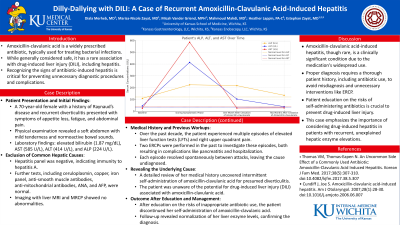Sunday Poster Session
Category: Liver
P1263 - Dilly-Dallying with DILI: A Case of Recurrent Amoxicillin-Clavulanic Acid-Induced Hepatitis
Sunday, October 27, 2024
3:30 PM - 7:00 PM ET
Location: Exhibit Hall E

Has Audio

Marisa-Nicole Zayat, MD
University of Kansas School of Medicine
Wichita, KS
Presenting Author(s)
Diala Merheb, MD1, Micah Vander Griend, MPH1, Marisa-Nicole Zayat, MD1, Mahmoud Mahdi, MD1, Heather Lappin, PA-C2, Estephan Zayat, MD2
1University of Kansas School of Medicine, Wichita, KS; 2Kansas Gastroenterology and Endoscopy, LLC, Wichita, KS
Introduction: Amoxicillin-clavulanic acid, a commonly used antibiotic, can rarely induce drug-related hepatitis.
Case Description/Methods: A 70-year-old female patient with a history of Raynaud’s disease, recurrent diverticulitis, and multiple episodes of elevated liver enzymes presented with symptoms of appetite loss, fatigue, and abdominal pain. On examination, her abdomen was soft and mildly tender, with normoactive bowel sounds. Laboratory results indicated increased bilirubin (1.87 mg/dL), AST (585 U/L), ALT (414 U/L), and ALP (224 U/L). Notably, a hepatitis panel was negative, and the patient was immune to hepatitis A. Further workup, including ceruloplasmin, copper, iron panel, anti-smAbs, anti-mitochondrial Abs, ANA, and AFP, was normal. Liver MRI and MRCP were also normal. Over the last decade, the patient had undergone two separate ERCPs to investigate similar presentations, namely elevated LFTs and right upper quadrant pain with negative serologic and radiologic workup. These ERCPs resulted in complications including pancreatitis and hospitalization. Her elevated LFTs and right upper quadrant pain would resolve between attacks.
Upon delving deeper into the patient’s medical history, the patient revealed intermittent self-administration of amoxicillin-clavulanic acid for presumed diverticulitis attacks. Following education on inappropriate antibiotic use and the risk of drug-induced liver injury (DILI), the patient discontinued her as needed usage of amoxicillin-clavulanic acid. Subsequent follow-up revealed normalization of liver enzyme levels.
Discussion: We report a case of recurrent, self-administered amoxicillin-clavulanic acid-induced hepatitis that evaded diagnosis for ten years. Amoxicillin-clavulanic acid-induced hepatitis is rare yet clinically relevant. Recognizing this side effect and education on proper use is crucial given the drug’s widespread use. The importance of reviewing the patient’s history of antibiotic use cannot be overstated. Awareness of the patient’s antibiotic history might have avoided overlooking the diagnosis and averted unnecessary procedures.
Note: The table for this abstract can be viewed in the ePoster Gallery section of the ACG 2024 ePoster Site or in The American Journal of Gastroenterology's abstract supplement issue, both of which will be available starting October 27, 2024.
Disclosures:
Diala Merheb, MD1, Micah Vander Griend, MPH1, Marisa-Nicole Zayat, MD1, Mahmoud Mahdi, MD1, Heather Lappin, PA-C2, Estephan Zayat, MD2. P1263 - Dilly-Dallying with DILI: A Case of Recurrent Amoxicillin-Clavulanic Acid-Induced Hepatitis, ACG 2024 Annual Scientific Meeting Abstracts. Philadelphia, PA: American College of Gastroenterology.
1University of Kansas School of Medicine, Wichita, KS; 2Kansas Gastroenterology and Endoscopy, LLC, Wichita, KS
Introduction: Amoxicillin-clavulanic acid, a commonly used antibiotic, can rarely induce drug-related hepatitis.
Case Description/Methods: A 70-year-old female patient with a history of Raynaud’s disease, recurrent diverticulitis, and multiple episodes of elevated liver enzymes presented with symptoms of appetite loss, fatigue, and abdominal pain. On examination, her abdomen was soft and mildly tender, with normoactive bowel sounds. Laboratory results indicated increased bilirubin (1.87 mg/dL), AST (585 U/L), ALT (414 U/L), and ALP (224 U/L). Notably, a hepatitis panel was negative, and the patient was immune to hepatitis A. Further workup, including ceruloplasmin, copper, iron panel, anti-smAbs, anti-mitochondrial Abs, ANA, and AFP, was normal. Liver MRI and MRCP were also normal. Over the last decade, the patient had undergone two separate ERCPs to investigate similar presentations, namely elevated LFTs and right upper quadrant pain with negative serologic and radiologic workup. These ERCPs resulted in complications including pancreatitis and hospitalization. Her elevated LFTs and right upper quadrant pain would resolve between attacks.
Upon delving deeper into the patient’s medical history, the patient revealed intermittent self-administration of amoxicillin-clavulanic acid for presumed diverticulitis attacks. Following education on inappropriate antibiotic use and the risk of drug-induced liver injury (DILI), the patient discontinued her as needed usage of amoxicillin-clavulanic acid. Subsequent follow-up revealed normalization of liver enzyme levels.
Discussion: We report a case of recurrent, self-administered amoxicillin-clavulanic acid-induced hepatitis that evaded diagnosis for ten years. Amoxicillin-clavulanic acid-induced hepatitis is rare yet clinically relevant. Recognizing this side effect and education on proper use is crucial given the drug’s widespread use. The importance of reviewing the patient’s history of antibiotic use cannot be overstated. Awareness of the patient’s antibiotic history might have avoided overlooking the diagnosis and averted unnecessary procedures.
Note: The table for this abstract can be viewed in the ePoster Gallery section of the ACG 2024 ePoster Site or in The American Journal of Gastroenterology's abstract supplement issue, both of which will be available starting October 27, 2024.
Disclosures:
Diala Merheb indicated no relevant financial relationships.
Micah Vander Griend indicated no relevant financial relationships.
Marisa-Nicole Zayat indicated no relevant financial relationships.
Mahmoud Mahdi indicated no relevant financial relationships.
Heather Lappin indicated no relevant financial relationships.
Estephan Zayat indicated no relevant financial relationships.
Diala Merheb, MD1, Micah Vander Griend, MPH1, Marisa-Nicole Zayat, MD1, Mahmoud Mahdi, MD1, Heather Lappin, PA-C2, Estephan Zayat, MD2. P1263 - Dilly-Dallying with DILI: A Case of Recurrent Amoxicillin-Clavulanic Acid-Induced Hepatitis, ACG 2024 Annual Scientific Meeting Abstracts. Philadelphia, PA: American College of Gastroenterology.
